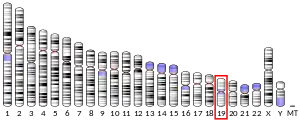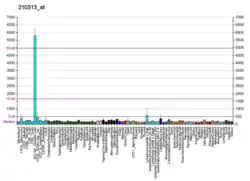LILRA4
Leukocyte immunoglobulin-like receptor subfamily A member 4 is a protein that in humans is encoded by the LILRA4 gene.[3][4]
This gene encodes an immunoglobulin-like cell surface protein preferentially expressed in plasmacytoid dendritic cells (PDCs). This gene is highly expressed in PDCs, and is found to be rapidly down-regulated by interleukin 3 (IL3). This gene is one of the 19 highly related genes that form a leukocyte immunoglobulin-like receptor gene cluster (LRC) at chromosomal region 19q13.4.[4]
References
- ENSG00000276798, ENSG00000274185, ENSG00000239961 GRCh38: Ensembl release 89: ENSG00000277092, ENSG00000276798, ENSG00000274185, ENSG00000239961 - Ensembl, May 2017
- "Human PubMed Reference:". National Center for Biotechnology Information, U.S. National Library of Medicine.
- Wende H, Volz A, Ziegler A (Sep 2000). "Extensive gene duplications and a large inversion characterize the human leukocyte receptor cluster". Immunogenetics. 51 (8–9): 703–13. doi:10.1007/s002510000187. PMID 10941842. S2CID 20719684.
- "Entrez Gene: LILRA4 leukocyte immunoglobulin-like receptor, subfamily A (with TM domain), member 4".
Further reading
- Cho M, Ishida K, Chen J, et al. (2008). "SAGE library screening reveals ILT7 as a specific plasmacytoid dendritic cell marker that regulates type I IFN production". Int. Immunol. 20 (1): 155–64. doi:10.1093/intimm/dxm127. PMID 18048391.
- Sellick GS, Wade R, Richards S, et al. (2008). "Scan of 977 nonsynonymous SNPs in CLL4 trial patients for the identification of genetic variants influencing prognosis". Blood. 111 (3): 1625–33. doi:10.1182/blood-2007-08-110130. PMID 18006695.
- Zhan X, Desiderio DM (2006). "Nitroproteins from a human pituitary adenoma tissue discovered with a nitrotyrosine affinity column and tandem mass spectrometry". Anal. Biochem. 354 (2): 279–89. doi:10.1016/j.ab.2006.05.024. PMID 16777052.
- Cao W, Rosen DB, Ito T, et al. (2006). "Plasmacytoid dendritic cell–specific receptor ILT7–FcɛRIγ inhibits Toll-like receptor–induced interferon production". J. Exp. Med. 203 (6): 1399–405. doi:10.1084/jem.20052454. PMC 2118323. PMID 16735691.
- Ju XS, Hacker C, Scherer B, et al. (2004). "Immunoglobulin-like transcripts ILT2, ILT3 and ILT7 are expressed by human dendritic cells and down-regulated following activation". Gene. 331: 159–64. doi:10.1016/j.gene.2004.02.018. PMID 15094202.
- Tedla N, Bandeira-Melo C, Tassinari P, et al. (2003). "Activation of human eosinophils through leukocyte immunoglobulin-like receptor 7". Proc. Natl. Acad. Sci. U.S.A. 100 (3): 1174–9. Bibcode:2003PNAS..100.1174T. doi:10.1073/pnas.0337567100. PMC 298746. PMID 12529506.
- Strausberg RL, Feingold EA, Grouse LH, et al. (2003). "Generation and initial analysis of more than 15,000 full-length human and mouse cDNA sequences". Proc. Natl. Acad. Sci. U.S.A. 99 (26): 16899–903. Bibcode:2002PNAS...9916899M. doi:10.1073/pnas.242603899. PMC 139241. PMID 12477932.
- Rissoan MC, Duhen T, Bridon JM, et al. (2002). "Subtractive hybridization reveals the expression of immunoglobulin-like transcript 7, Eph-B1, granzyme B, and 3 novel transcripts in human plasmacytoid dendritic cells". Blood. 100 (9): 3295–303. doi:10.1182/blood-2002-02-0638. PMID 12384430.
- Young NT, Canavez F, Uhrberg M, et al. (2001). "Conserved organization of the ILT/LIR gene family within the polymorphic human leukocyte receptor complex". Immunogenetics. 53 (4): 270–8. doi:10.1007/s002510100332. PMID 11491530. S2CID 2819935.
This article is issued from Wikipedia. The text is licensed under Creative Commons - Attribution - Sharealike. Additional terms may apply for the media files.


